The subtitle for Silk Road is “A journal of writings on place.” In an interview with John Rember, he coins a contemporary definition for place: “Place used to be something that stayed the same, by which you could measure changes in yourself. Now you have to stay the same and watch while place changes. It means that place, if it’s going to exist at all, has to become internal rather than external.” Silk Road’s authors write about different places in the traditional sense – as physical entities – but they also inevitably write about the internal sense of place as well. An excellent example of this duality is in John Rember’s own story, “When a Cold Place Turns Hot”: “Can you ever really know a place if you keep changing?” his narrator asks. Continue reading “Silk Road – Spring 2007”
NewPages Blog
At the NewPages Blog readers and writers can catch up with their favorite literary and alternative magazines, independent and university presses, creative writing programs, and writing and literary events. Find new books, new issue announcements, contest winners, and so much more!
Silk Road – Spring 2007
Spread the word!
Tin House – Spring 2008
Tin House is thick – 200 pages – and it contains enough variety and ingenuity to enthrall even the pickiest reader. Continue reading “Tin House – Spring 2008”
Spread the word!
The Yale Review – April 2008
Its website identifies The Yale Review as the “Nation’s Oldest Literary Quarterly.” The magazine is august, perhaps, but not stodgy, on the evidence of its most recent issue. The strength of this installment is in its poetry, particularly in the selections from Louise Glück, David Wagoner, and Carl Phillips. Glück’s four poems look at themes of loss, in the personal and natural realms. Her final poem, “Sunrise,” connects both spheres: “I had to see if the fields were still shining, / the sun telling the same lies about how beautiful the world is / when all you need to know of a place is, do people live there. / If they do, you know everything.” Continue reading “The Yale Review – April 2008”
Spread the word!
Zahir – Spring 2008
The stories presented in this issue of Zahir challenge the conventions of speculative fiction. Instead of tracking plots inspired by a unique idea or extrapolation of science, the reader is invited to consider the consequences of the hook at the same time as the characters. Continue reading “Zahir – Spring 2008”
Spread the word!
In Memoriam :: Nuala O’Faolain
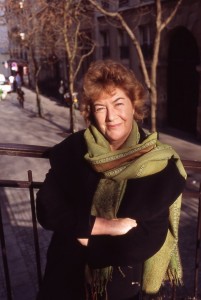 In catching up on my RSS feeds, I just now learned of the passing of Nuala O’Faolain. I am saddened to hear of this loss to us all, most especially those closest to her. I only learned of her work a few years ago while listening to the Diane Rehm show on NPR. I was absolutely fascinated with O’Faolain’s discussion of her memoir, Almost There: The Onward Journey of a Dublin Woman. As can happen with Rehm’s interviews, their discussion went off onto many other topics, including O’Faolain’s views on relationships and her lack of belief in any kind of afterlife. Her candid assuredness and openess in discussing these topic with Rehm led me to go out and gather as much of her writing as I could find. My respect of her grew through these as well as her staunch journalism work; and of her decision to travel during her last months of life, I find it in keeping with the fortitude of her character I will forever admire.
In catching up on my RSS feeds, I just now learned of the passing of Nuala O’Faolain. I am saddened to hear of this loss to us all, most especially those closest to her. I only learned of her work a few years ago while listening to the Diane Rehm show on NPR. I was absolutely fascinated with O’Faolain’s discussion of her memoir, Almost There: The Onward Journey of a Dublin Woman. As can happen with Rehm’s interviews, their discussion went off onto many other topics, including O’Faolain’s views on relationships and her lack of belief in any kind of afterlife. Her candid assuredness and openess in discussing these topic with Rehm led me to go out and gather as much of her writing as I could find. My respect of her grew through these as well as her staunch journalism work; and of her decision to travel during her last months of life, I find it in keeping with the fortitude of her character I will forever admire.
Nuala O’Faolain, 68; Irish journalist, wrote memoir ‘Are You Somebody?’
By Mary Rourke, Los Angeles Times Staff Writer
May 19, 2008
Nuala O’Faolain, the Irish journalist and author whose 1996 memoir, “Are You Somebody?,” captured international attention for its soul-searching candor, died May 9 in a Dublin hospice of complications from lung cancer, according to news reports from Ireland. She was 68.
O’Faolain, a resident of Barrtra in County Clare, Ireland, with homes in Dublin and New York City, recently announced that she had inoperable lung cancer and she had turned down the option of chemotherapy, choosing instead to travel in Europe until she had to be hospitalized.
She wrote about everyday events in a way that touched on basic human realities. For one column she visited the intensive care unit of a maternity ward where the fragile newborns didn’t cry. They couldn’t, she wrote, because they were sedated.
She often covered political and social issues from her outspoken, feminist perspective. In general, however, she was known to be unpredictable in her views, with a gentle sense of humor.
O’Faolain’s bestselling memoir began as an idea for a book-length collection of her columns. She started writing an introduction that grew into several hundred pages of intensely personal autobiography. The memoir’s subtitle, “The Accidental Memoir of a Dublin Woman,” suggests the change in direction.
“I had to answer the question nobody had asked: Where do my opinions come from?” O’Faolain said of her purpose for writing a memoir, in a 2001 New York Times interview. “The answer was simple. Ideology had nothing to do with it. My opinions come from my life.”
[Read the rest on LA Times.]
Spread the word!
Book Contests Updated
I’ve been working away at the book contests page. Those listed are sponsored by publications, publishers and universities listed elsewhere on the NewPages site. If you have a contest that is not listed, please let me know by sending a weblink to: denisehill-at-newpages.com.
Spread the word!
New Lit on the WebBlock :: 5th Gear
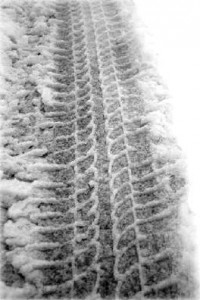 Originally published in print from October 1993-April 2002 by Andy Fogle with the help of Chris Saywer (author of the zine Ingin the Ooh), 5th Gear dedicated itself to publishing a variety of poetic forms. When Saywer moved, the magazine took a hit in production quality and Fogle hung it up for four years. Now it’s back with the help of Adam Parez and Mark Fitzgerald.
Originally published in print from October 1993-April 2002 by Andy Fogle with the help of Chris Saywer (author of the zine Ingin the Ooh), 5th Gear dedicated itself to publishing a variety of poetic forms. When Saywer moved, the magazine took a hit in production quality and Fogle hung it up for four years. Now it’s back with the help of Adam Parez and Mark Fitzgerald.
The publication now runs five-poem monthly installments. Fogle notes on the site that they started in January, but only March and April are currently archived online. “In this new format, in addition to poetry, we envision publishing reviews, essays, fiction, and artwork. However, at present, we are only accepting unsolicited poetry; for now, submissions for all other genres are by invitation only.”
Although the publication is online, only paper submissions are accepted. The upshot is the response: “We reply in 3-12 weeks, and comment fairly often; if we like your work, don’t be surprised if that commentary is pretty detailed/specific.”
Additionally, Fogle puts this call out on the site: “I’d also like to reach out to any poets previously published in 5th Gear and old MFA pals. If you have fond memories (or even just decent ones; I fear there are also a few nightmares) of this magazine, just drop me a line at the Schenectady box; I’d love to see your work again.”
For more information, swing by 5th Gear.
Spread the word!
Awards :: PEN American Center
The 2008 PEN Literary Awards recipients were determined by distinguished panels of judges, all of whom are writers, editors, translators, poets, or playwrights themselves. This year’s program will see the conferral of a new award: the PEN/Jacqueline Bograd Weld Award for Biography.
PEN/Nabokov Award ($20,000)
To Cynthia Ozick
PEN/Robert Bingham Fellowship for Writers ($35,000)
To Dalia Sofer
PEN/Jacqueline Bograd Weld Award for Biography ($10,000)
To Janet Malcolm for Two Lives: Gertrude and Alice
Pels Foundation Awards for Drama ($7,500)
To Richard Nelson and Sarah Ruhl
PEN/Phyllis Naylor Working Writer Fellowship ($5,000)
To Theresa Nelson for Julia Delany: The American Version
PEN/Voelcker Award for Poetry ($5,000)
To Kimiko Hahn
PEN Award for Poetry in Translation ($3,000)
To Rosmarie Waldrop for Lingos I-IX
PEN Translation Prize ($3,000)
To Margaret Jull Costa for The Maias
Spread the word!
NewPages Book Reviews :: Matt Bell Takes the Helm
 Matt Bell reads (a lot). Matt Bell writes (a lot). Matt Bell drinks beer (no comment – but we’ll take donations for Matt as well). This was enough to get Matt Bell started writing reviews with NewPages a year or so ago. But this wasn’t enough for Matt. He wanted more, and as we weren’t the least bit abashed in taking advantage of that energy, crowned him Book Review Editor.
Matt Bell reads (a lot). Matt Bell writes (a lot). Matt Bell drinks beer (no comment – but we’ll take donations for Matt as well). This was enough to get Matt Bell started writing reviews with NewPages a year or so ago. But this wasn’t enough for Matt. He wanted more, and as we weren’t the least bit abashed in taking advantage of that energy, crowned him Book Review Editor.
As editor, Matt is large and in charge of the section: recruiting and screening prospective reviewers, managing content, and reading for first edit. He does this in addition to keeping up with his own writing, having published numerous short stories and now working on his first novel, as well as maintaining a bill-paying job and a personal life in there somewhere that includes his wife, Jessica.
I don’t know how he does it, but given the immediate ramp-up of the book reviews, and the positive feedback we’ve received thus far, it is definitely working. I asked Matt to explain what he sees as the role of book reviews for NewPages readers, and his role as a reviewer as well as editor:
“When I write my own reviews, my goals are to promote good writing, to explain why I think a book is worth the reader’s time, and to dive in critically to try and expose some of what makes the book work. In editing other people’s reviews, the goals are similar: I want to bring out the strengths in each reviewer’s own style and to help them write as strongly and as clearly as possible.
“Overall, I want the NewPages book review section to be a place that is unapologetically enthusiastic about books, especially the great work coming out of the smaller presses. Every day I read news stories about declining readerships, the death of the short story, the relegation of poetry to academia, and I can’t help but disagree. I think this is a great time to be a reader. There are so many good writers out there, and it’s our job to keep giving those people the critical attention their work deserves.
“I truly believe that fiction in general and the short story in particular is in as good a shape today as it has ever been. Perhaps its commercial potential has diminished, but its artistic potential is off the charts. I’m less personally knowledgeable about the state of poetry, but I think excellent writing is being done there as well, at least judging from some of the reviews we’ve published lately and the enthusiasm of those reviewers.”
Matt Bell lives in Ann Arbor, MI. His fiction has appeared in magazines such as Barrelhouse, Juked, Caketrain, and McSweeney’s Internet Tendency, and is upcoming in No Colony and Hobart. He can be found online at www.mdbell.com.
If you are a reader/writer interested in reviewing for NewPages, contact Matt Bell (newpages.matt-at-gmail.com) for book reviews and/or Denise Hill (denisehill-at-newpages.com) for literary magazine reviews.
If you want to know about having your book or lit mag reviewed on NewPages, please see our FAQ page.
Spread the word!
Tupelo/Crazyhorse Publishing Institute – Deadline Extended
*Application Deadline Extended to June 3, 2008*
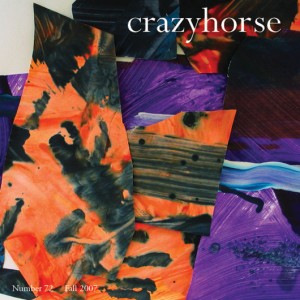 The Crazyhorse/Tupelo Press Publishing Institute
The Crazyhorse/Tupelo Press Publishing Institute
College of Charleston
June 3–30, 2008
The College of Charleston and the literary journal Crazyhorse have partnered with Tupelo Press, an independent literary press, to form the Crazyhorse/Tupelo Press Publishing Institute. The institute offers:
• training in the theory and practice of literary publishing and editing.
• preparation for successful careers as publishers and editors.
• a supplement to the curricula of MFA and Ph.D. programs that focus primarily on craft.
The Crazyhorse/Tupelo Press Publishing Institute brings together two important literary institutions: an internationally distinguished, award-winning publisher and a literary journal with nearly 50 years of continuous publication. The institute is open to graduate students and emerging writers. The program of study is unique in combining the opportunity for a practical internship at Crazyhorse with important lessons on the first book through an intensive, four-week course chronicling the selection of a winner in the annual Tupelo Press First Book Prize.
Spread the word!
The “Obscure” Summer Reading List
Posted last week on the Village Voice, this article includes a list of famous writers’ favorite obscure books, each with a brief comment. Check out a few mentions here:
Our Favorite Writers Pick Their Favorite Obscure Books
by Alexander Nazaryan
From the Village Voice Summer Guide
May 13th, 2008
Jennifer Egan
You Can’t Live Forever, by Harold Q. Masur
John Banville
Some People, by Harold Nicolson
Donna Tartt
Blood in the Parlor, by Dorothy Dunbar
Rick Moody
Frank Zappa: The Negative Dialectics of Poodle Play, by Ben Watson
Jonathan Ames
The Lunatic at Large, by J. Storer Clouston
Read the rest of the list complete with comments on Village Voice online.
Spread the word!
Lit Radio :: Bibliocracy
 Bibliocracy Radio is hosted by Santa Monica Review editor Andrew Tonkovich, Bibliocracy is a weekly literary arts program featuring readings and discussions with writers. Recent guests include: Al Young, Judith Freeman, Daniel Olivas, Reyna Grande, Michael Jaime-Becerra, Toni Mirosevich, Terese Svoboda, Katha Pollitt, Diane Lefer.
Bibliocracy Radio is hosted by Santa Monica Review editor Andrew Tonkovich, Bibliocracy is a weekly literary arts program featuring readings and discussions with writers. Recent guests include: Al Young, Judith Freeman, Daniel Olivas, Reyna Grande, Michael Jaime-Becerra, Toni Mirosevich, Terese Svoboda, Katha Pollitt, Diane Lefer.
Spread the word!
John Lithgow + Cheerios = Books
 First Book has teamed up with Cheerios and John Lithgow to present this year’s Cheerios Book Donation Challenge, which gives readers the chance to determine where Cheerios will donate 100,000 new books by Lithgow to children across the country. For every question answered correctly, readers can vote for the state they’d like to receive new books for children in need. The top 5 vote-getting states will each receive 20,000 new books for local children! Votes can be cast from now until Sunday, June 15!
First Book has teamed up with Cheerios and John Lithgow to present this year’s Cheerios Book Donation Challenge, which gives readers the chance to determine where Cheerios will donate 100,000 new books by Lithgow to children across the country. For every question answered correctly, readers can vote for the state they’d like to receive new books for children in need. The top 5 vote-getting states will each receive 20,000 new books for local children! Votes can be cast from now until Sunday, June 15!
I tried the “quiz” – questions are taken from books promoted through Cheerios Spoonfuls of Stories program (with Simon & Schuster). For each question I got correct, I was able to pick which state I wanted to receive the books. I went through about 15 questions and, not having read the books, got 11 questions correct. It would be good encouragement for kids to have them read at least some of the books in advance and see if they could answer the questions for those books. I don’t know if there’s a cap on the number of questions – but wrong answers don’t stop you from continuing.
Organizations that want to be considered to receive free books can sign up on the First Book website.
Spread the word!
Georgia Review Receives Awards
 The University of Georgia’s Georgia Review Wins General Excellence Award and Six Others in 2008 GAMMA Awards Competition
The University of Georgia’s Georgia Review Wins General Excellence Award and Six Others in 2008 GAMMA Awards Competition
The Georgia Review, the University of Georgia’s nationally renowned quarterly journal of arts and letters, earned seven honors, including four golds, at the Magazine Association of the Southeast’s 2008 GAMMA Awards. Chief among the wins was the General Excellence award for publications with less than one million dollars in revenue.
Other gold awards for UGA’s standout publication were as follows: Best Feature, for “‘The Commerce Between Us’: Correspondence from the Archives, 1977-2000 (Spring 2007 issue); Best Profile, for “Annabel Before the War: Only What I See” by Joy Passanante (Summer 2007); and Best Photography, for “3-D” by Thomas Allen (Spring 2007). “Pursuing the Great Bad Novelist” (Fall 2007), the first-ever publication by Laura Sewell Matter, earned a silver award in the Essays category.
Read the full press release here.
Spread the word!
Bard Fiction Prize 6.15
The Bard Fiction Prize is awarded annually to a promising, emerging writer who is an American citizen aged 39 years or younger at the time of application.
In addition to the monetary award, the winner receives an appointment as writer-in-residence at Bard College for one semester without the expectation that he or she teach traditional courses. The recipient will give at least one public lecture and will meet informally with students.
Deadline July 15, 2008
More info here: Bard College Fiction Prize
Spread the word!
Residency :: Lake Forest College 5.15
The Madeleine P. Plonsker Emerging Writer’s Residency Prize
Lake Forest College, in conjunction with the &NOW Festival, invites applications for an emerging poet under forty years old, with no major book publication to spend two months (February-March or March-April 2009) in residence at our campus in Chicago’s northern suburbs on the shore of Lake Michigan. There are no formal teaching duties attached to the residency. Time is to be spent completing a manuscript, participating in the Lake Forest Literary Festival, and offering two public presentations.
The completed manuscript will be published (upon approval) by the new Lake Forest College Press &NOW Books imprint. The stipend is $10,000, with a housing suite and campus meals provided by the college.
Send curriculum vita, manuscript in progress, and a statement of plans for the completion of the manuscript to Plonsker Residency, Department of English, Lake Forest College, Box A16, 555 N. Sheridan Road, Lake Forest, IL 60045. Review of manuscripts by judges Robert Archambeau, Davis Schneiderman, and Joshua Corey will begin May 15, 2008 and continue until the position is filled.
Spread the word!
Comments on the Absinthe Festival
 The Absinthe Festival of New European Film and Writing hosted by Oakland University, Friday May 9-10 was a great cultural getaway. Close to home, we made a mini-vacation of it and caught Eamonn Wall and Valzhyna Mort reading on Friday night.
The Absinthe Festival of New European Film and Writing hosted by Oakland University, Friday May 9-10 was a great cultural getaway. Close to home, we made a mini-vacation of it and caught Eamonn Wall and Valzhyna Mort reading on Friday night.
I’ve not heard of Eamonn Wall before, and I am grateful for the introduction to his works. Combined with strong, rooted imagery, a number of his works read like stories and were easy to follow for an oral reading, but I kept feeling that I wanted to go right back and read to myself what I had just heard in order to more fully absorb it. Refuge at DeSoto Bend, his newest collection published by Salmon Press, includes a section of poems on the Wexford Container Tragedy, a piece of history from 2001 I vaguely recalled – thirteen immigrants seeking asylum found in a crate that was misrouted before being brought to Wexford, Ireland. Eight of them had died. Eamonn’s treatment of this tragedy creates a historical retelling as well as emotional reliving of the event, but also attempts some sense of respectful remembrance.
Valzhyna Mort followed, and began in dramatic fashion by reading the first poem of her collection Factory of Tears (Copper Canyon Press) in Belarusian, then in English. She remarked on the nature of translation, that, because of cultural differences, “some things you just never get,” but how she also enjoyed translation “so much better than writing.” She continued reading from her collection, interspersed with commentary about her work. She remarked on some poems and their interpretations. For example, the poem “Men” readers often think is a love poem. “It’s not,” Mort clarified. “It’s a hate poem.”
In an interesting discussion of “A Poem About White Apples,” Mort reflected on the nature of translation by telling about one of her readings when she spoke with the sign interpreter. Before reading the poem, Mort explains that white apples are a common fruit in her native country, and that the poem is a reflection on that first moment when she truly felt displaced. How she craved the taste and texture of this specific fruit that could not be found in the U.S. At that previous reading, the sign interpreter had thanked her for this explanation, because having read the poem, he was going to interpret the apples as “breasts.” Mort said, “It’s just about apples.” I and others in the audience laughed at this story, but were brought up abruptly when she said, “And it’s a sad poem.” Then read on.
Much of her reading is this way; as you might think to relax and feel warmth in any moment, it is suddenly pulled up short, and the language – heavily metaphoric and imagistic – in her creations have a repeated pummeling effect on your core. It reminded me of how a little cartoon hero might seem so unassuming visually, but in punching its opponent, sends the villain flying through the air to smash through several brick walls, leaving the outline of the helpless body. Poem after poem, line after line of her work caught me, threw me, held me up against that wall before letting me drop down. It is exhausting poetry to read/hear, but of such allure that once is never enough. I bought her book so I could experience these feelings again and again.
It was curious that she mentioned several times that this or that poem might be “lighter” than the others, and read one saying that it would be a funny poem. She seemed almost apologetic that her poems did not bring laughter to the audience. Do we expect poets to make us laugh? I wondered. I have quickly come not to expect that from her poems, and am grateful for what they do deliver in terms of my responses to them. I don’t need to be made to laugh. Other emotional responses are just as important for me as a reader, and often times much more lasting.
Saturday brought the German film Yella , the Romanian film How I Spent the End of the World, both of which I would recommend to viewers, and a reading by Polish poet Piotr Sommer. Sommer’s works were a contrast to the previous evening’s readings. His works are short, almost hard to listen to because they go so quickly and were so condensed in their language and imagery. Several times, I wanted to say, “Would you read that one again?” but not because I wasn’t listening. I just needed a second chance to take it all in.
A Q&A followed his reading, and I asked, “What do you think is lost in translation and what do you think is gained in translation?” His being not only a writer whose works are translated, but a translator himself, he seemed to first beg off the question by saying, “I’m not good at aphorisms.” Confessing it would be easier to look at specific examples to make more direct analysis, he did offer the generalized observation that if it is a good poem, well written, that for the purpose of translations, nothing really will be lost, and that which is may not be that important to the culture of the language into which it is translated. He went on with some raised interest to speak of how much can be gained in the translation, how translated works can become something new of their own. Not necessarily completely different from the original piece, but each working on its own plane, parallel to one another.
There were more events at the festival, including a reading by translators Doris Runey, Marilynn Rashid, and Keith Taylor, a screening of the Russian film The Island, and numerous short films by Oakland University students. Unfortunately, we were not able to take in all the festival had to offer, but with such a strong start, I hope that Absinthe is able to offer this opportunity again next year. Kudos to Dwyane D. Hayes, Jessica Bomarito and all the Absinthe and UO folks who made this a very well organized and memorable event.
Spread the word!
Art :: Wheelchair = Paintbrush
 Tommy Hollenstein: Tracking Art
Tommy Hollenstein: Tracking Art
By Sam Maddox
New Mobility, April 2008
“Tommy Hollenstein’s artwork is colorful and chaotic yet infused with the optimism and transformative drama that define the Southern California experience. Tommy is a native Angelino ex-surfer boy who sports a mini-Mohawk bleach job and a tanned and mellow Valley boy manner. He’s been getting lots of traction, so to speak, with his work. He paints by joystick — that is, with the tires of his power wheelchair — rolling through paint spilled on the floor, or with a dab of color coated on the tires to layer colors toward a unique, complex whole. He calls it a sort of ‘action painting.'”
Read the rest and see several more images of Hollenstein and his art on New Mobility.
Spread the word!
Visit the Red Room
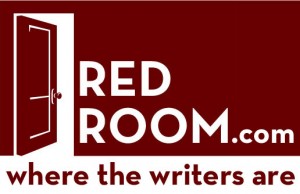 No, I’m not talking about The Shining…
No, I’m not talking about The Shining…
“The Red Room online community was founded in 2007 by CEO Ivory Madison. Madison previously founded the Red Room Writers Society, a brick-and-mortar writers’ community in a historic mansion in San Francisco. While only four writers signed up for Madison’s original “Red Room Writers Studio” back in 2002, by 2007 hundreds of authors, including Pulitzer Prize winners, had joined forces to launch the online home of the world’s greatest writers.”
The site offers a page for each of its author members with information about their books, events, video, and links. Visitors can search or browse authors, books, events, blogs, podcasts and more. Individuals can also sign up for membership to participate in the site.
Great feature for readers looking for new authors: authors are searchable by genre and areas of interest (such as LGBT or cultural studies).
Don’t delay – swing by the Red Room now!
Spread the word!
Comics :: The Secret Life of Nancy
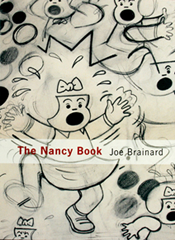 The Nancy Book
The Nancy Book
By Joe Brainard
Published by Siglio Press
The world has in Joe Brainard a semi-secret maverick hero who will win new friends indefinitely one by one.–Peter Schjeldahl
From 1963 to 1978 Joe Brainard created more than one hundred works of art that appropriated the classic comic strip character Nancy and sent her into an astonishing variety of spaces, all electrified by the incongruity of her presence. The Nancy Book collects more than fifty of these images for the first time and features collaborations with luminary poets Bill Berkson, Ted Berrigan, Robert Creeley, Frank Lima, Frank O’Hara, Ron Padgett and James Schuyler, as well as original essays by Ron Padgett and Ann Lauterbach.
Also available are limited editions, which include a hand-pulled photo-lithograph housed in a foil-stamped portfolio and slipcased with the trade edition. The edition is 100, numbered and stamped by the Estate of Joe Brainard.
Spread the word!
Festival :: Absinthe – European Literature and Film
Absinthe Festival of New European Film and Writing
Co-hosted by Oakland University
May 9-10, 2008
Eamonn Wall, Valzhyna Mort, and Piotr Sommers are among the writers appearing. In addition, there will be screenings of three feature films: from Germany Yella, from Romania The Way I Spent the End of the World, and from Russia The Island. All events are FREE and open to the public.
Spread the word!
New Lit on the WebBlock :: Kartika Review
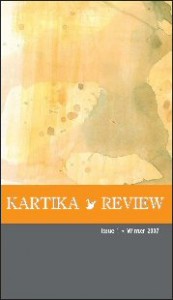 Kartika Review publishes literary fiction, poetry, and essays that endeavor to expand and enhance the mainstream perception of Asian American creative writing. The journal also publishes book reviews, author interviews, and artwork relevant to the Asian Diaspora or authored by individuals of Asian descent. Kartika plans to sponsor readings, panel discussions, writing contests, and other creative activities for the Asian American community in both New York City and the Bay Area.
Kartika Review publishes literary fiction, poetry, and essays that endeavor to expand and enhance the mainstream perception of Asian American creative writing. The journal also publishes book reviews, author interviews, and artwork relevant to the Asian Diaspora or authored by individuals of Asian descent. Kartika plans to sponsor readings, panel discussions, writing contests, and other creative activities for the Asian American community in both New York City and the Bay Area.
Downloadable e-Book versions in PDF format are always free of charge and in addition, they will publish a print anthology of the best works every three issues. The print publication will be available for purchase online or through participating bookstores.
As a quarterly journal, they release issues in March, June, September, and December. Submissions by electronic mail year-round. Sim/subs accepted.
Spread the word!
The Dzanc Prize :: More than Money
The Dzanc Prize provides monetary aid in the sum of $5,000, to a writer of literary fiction. All writers applying for the Dzanc Prize must have a work-in-progress they can submit for review, and present the judges with a Community Service Program they can facilitate. Such programs may include anything deemed “educational” in relation to writing. Examples would include: working with HIV patients to help them write their stories; doing a series of workshops at a drop-in youth homeless center; running writing programs in inner-city schools; or working with older citizens looking to write their memoirs. All community programs under the Dzanc Prize must run for a full year.
Last year, Dzanc Books awarded the inaugural Dzanc Prize to Laura van den Berg. Laura is currently in the middle of a series of workshops she’s running in the New England prison system. At the end of Laura’s year, an anthology of work by the prisoners she is teaching will be compiled and published by Dzanc. Laura’s story collection, What the World Will Look Like When All of the Water is Gone, will also be published by Dzanc Books in fall 2009.
Submissions accepted from now through November 1, 2008.
See Dzanc Books website for more information.
Spread the word!
Conceptual Poetry Symposium and YouTube Challenge
Conceptual Poetry and its Others
Keynote Speaker Marjorie Perloff
May 29-31, 2008
The forthcoming publication of Craig Dworkin and Kenneth Goldsmith’s Anthology of Conceptual Poetry (based on the online Ubuweb Anthology of Conceptual Writing) is only one sign of the recent interest in the “tensions between materiality and concept” (Dworkin), in a “new new formalism,” based on constraints, both the Oulipo and Cagean variants, on citationality and found text, on sound play, and visual device. Is such “non-expressivist” poetry too extreme? Conceptual Poetry and Its Others brings together a variety of leading poets to debate the issue. Featured artistis: Caroline Bergvall, Charles Bernstein, Christian Bok, Craig Dworkin, Peter Gizzi, Kenneth Goldsmith, Susan Howe, Tracie Morris, Cole Swenson.
YouTube Challenge!
Videographer Jonathan VanBallenberghe built this YouTube video for the Conceptual Poetry and Its Others Symposium. We are struck by the endless possibilities of the form, and so have decided to create a challenge for you, the audience, to create your own video to answer the question, “What is conceptual poetry?” The only constraint is that somewhere in the video, this text should be included:
“Conceptual Poetry and Its Others. May 29-31, 2008. www.poetrycenter.arizona.edu.”
Upload a video to YouTube by May 21 and let us know about it. Top videos will be featured on the Conceptual Poetry webpage (and may be screened at the Symposium keynote address) and the winner will receive a cash prize, provided by someone, to be announced soon.
Spread the word!
Georgia Review Hosts Pulitzer Week
 The Georgia Review
The Georgia Review
presents
“The Pulitzer Legacy in Georgia”
27–30 October 2008
at the historic Jekyll Island Club
Jekyll Island, Georgia
Featuring Pulitzer Prize–winners Stephen Dunn (poetry), Natasha Trethewey (poetry), Edward J. Larson (history), and Hank Klibanoff (history), with additional writers to be announced.
Visit The Georgia Review website for more information and updates.
Spread the word!
Alice Blue – Issue 8
Upon entering the first page of Alice Blue you encounter tiny square shaped images of odd looking stuffed animals that, when touched with clicking mouse, turns into a word denoting each distinctive section of their website. With issue number 8 of Alice Blue you are reminded of E.E. Cummings at his surrealist best with a healthy swath of absurdist tendencies incorporated into a mix of short prose pieces and poems ranging from experiments in form, language or both. Continue reading “Alice Blue – Issue 8”
Spread the word!
Big Muddy – 2008
I immediately noticed that this small journal devotes a surprising amount of space to fiction and essays: 9 pieces total followed by 17 pages of reviews. Continue reading “Big Muddy – 2008”
Spread the word!
Blood Lotus – March 2008
Rage and risk in writing is a powerful tool that can generate the most passionate work. In Blood Lotus, issue 8, the editors believe that if you write you should “Write like words are beautiful, powerful and dangerous…” In “katrina” by R.D. Coleman we are exposed to such risks and conviction head on: “my family up and / left me here, they knew / it called to me. / …could smell the gas out by / the road. / life was done, she said. / she surely meant to die.” Continue reading “Blood Lotus – March 2008”
Spread the word!
Cimarron Review – Winter 2008
Who could resist Glendy Chan’s dazzling cover design of this edition of The Cimarron Review? Luckily, the poems and fiction within the journal don’t disappoint. Though not a themed issue, the editors clearly chose pieces with the big picture in mind. This journal really hangs together, with each work speaking to the next. Continue reading “Cimarron Review – Winter 2008”
Spread the word!
Columbia Poetry Review – Spring 2007
In my English class, I used this issue of this journal when I started our poetry section; I used it to show students the wide variety of poetry that’s out there. They think of poetry in traditional terms: rhyme, meter, regular looking stanzas. This issue shows what is possible in the poetry world. Continue reading “Columbia Poetry Review – Spring 2007”
Spread the word!
Connecticut Review – Fall 2007
Reading for review forces the consumption of entire publications in very short periods of time: not recommend for this particular journal. This is the kind of publication that would make a reader grateful for her own copy to read and linger over at intervals. Continue reading “Connecticut Review – Fall 2007”
Spread the word!
diode poetry journal – Winter 2008
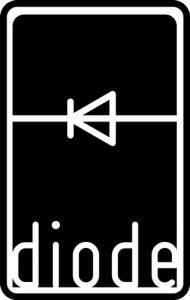
Diode, partially supported by Virginia Commonwealth University at Qatar, is a journal of American experimental and electric poetry transported to a foreign land and concerned with the inescapability of our American identities today: “Even eight thousand miles from the United States, the constant hammering of the American media machine reaches us. Our connections—wireless, satellite, cable—crackle with a seemingly endless loop of fear and consumption.” Diode‘s theoretical purpose is to break through all of this noise and communicate with the poem. Along with these serious pretensions, Diode amazes with its array of ambitious rhythmic poems that play like a firecracker laden sound and light show of invention and tactical and formal daring that does not let up until the final poem.
Spread the word!
The Dirty Goat – 2007
The Dirty Goat, published by Host Publications of Austin, Texas, is dedicated primarily to featuring literature from around the globe. This issue includes original works in Russian, Spanish, and Portuguese among other languages with English translations. There is also unique work by U.S. writers, none of whom I have heard of before. There is no editorial, but visual artists and translators provide commentary. Continue reading “The Dirty Goat – 2007”
Spread the word!
Earthshine – November 2007
Earthshine does not just claim that poetry can save humanity, it believes in the beauty of poetry and its innate ability to bridge the gap of understanding between different minds. Its simple yet attractive crescent moon design will lure curious and not-so-curious readers to their side. Continue reading “Earthshine – November 2007”
Spread the word!
Gargoyle – 2007
I wasn’t sure what to expect when I slid Gargoyle into my CD player. The colorful, beat-inspired cover assured me that “Poetry is the bomb, baby,” and I hoped that I would agree. Of course, I immediately thought about my past experiences with making “mixed tapes” and how difficult it can be when you’re only sticking with one genre, let alone many. However, after listening to the CD in its entirety, I knew that the editors of Gargoyle had done far more than compose a simple “mixed tape.” Continue reading “Gargoyle – 2007”
Spread the word!
Glimmer Train Stories – Spring 2008
Glimmer Train delivers a journal stock full of great stories. In this issue, the sometimes unusual jobs of characters seem as central to the stories as the characters themselves. The jobs both define the characters and the time periods as well as propel the plots forward. Continue reading “Glimmer Train Stories – Spring 2008”
Spread the word!
The Greensboro Review – Spring 2008
Inside The Greensboro Review’s simple cover is complex fiction and poetry. The first poem and story – “The Voice Before” by Melody S. Gee and “The Glass Mountain” by Aimee Pokwatka are Robert Watson Prize winners. Pokwatka’s story weaves a thematic fairytale told by an aunt into a story about a young woman, her sister, and her lover. The language is delightful: “It was a stupid question, but we forgave him because his eyes were the color of a sandstorm, and he sat still as an injured bird.” Continue reading “The Greensboro Review – Spring 2008”
Spread the word!
Manoa – Winter 2007
This volume of Manoa, edited by Frank Stewart and Barry Lopez, is dedicated to the theme Maps of Reconciliation: Literature and the Ethical Imagination. This journal includes many types of work: oratory, essays, poetry, fiction, photographic essays, an interview, and even a play. It’s uncommon to see a journal include all of these genres, and the Table of Contents divides them by genre, so it’s easy to navigate. Continue reading “Manoa – Winter 2007”
Spread the word!
Natural Bridge – 2007
Editor Steve Schreiner opens this issue of Natural Bridge with a reference to Poe’s explanation of human temptation, that our “spirit of the Perverse” pushes us to “perpetuate actions to our peril simply because we feel that we should not.” The “Temptation Issue” offers many representations of this concept, from the swarming guppies in the late Dale Denny’s “Big Aquarium,” to the breast milk in James Vescovi’s “La Leche is Good for You,” to sticking one’s tongue to a cold porch railing in Amy M. Clark’s “Dumb.” Continue reading “Natural Bridge – 2007”
Spread the word!
Paradigm – 2008
In the appropriately named Paradigm, it is as if all the disparate forms of literature have unified to create a beautiful spiders web of art that includes sounds for the ears too. If you try to read every piece in one sitting, you may be so enthralled as to stay up to the wee hours of the night. Continue reading “Paradigm – 2008”
Spread the word!
The Sewanee Review – Winter 2008
The Sewanee Review begins with twenty pages of “Current Books in Review” written succinctly about both authors and their current books, making these introductory pages informative and entertaining. Continue reading “The Sewanee Review – Winter 2008”
Spread the word!
SUB-LIT – Number 1
In SUB-LIT’s first issue, you get the not so subtle impression that you will be titillated or at the very least tantalized. And you will, but in a more intellectually risky manner than first expected when you come face to face with the sexy 60’s style rock’n’roll poster on their website. The poems and stories in this issue challenge your definition of the truth. Continue reading “SUB-LIT – Number 1”
Spread the word!
Virginia Quarterly Review – Spring 2008
The fiction in this issue of the VQR offers “Superhero Stories.” But none of the protagonists of the short fiction that opens the magazine – a discharged sailor who suffered psychic and physical wounds in the 1946 Bikini Atoll atomic bomb test; a masked vigilante who comes across as “a slurring crackpot taking a momentary break from a barbiturate triathlon” in his only public appearance; and a homebody in boxer shorts who commandeers the voices of televangelists – are paragons of virtue. Instead, Scott Snyder, Tom Bissell, and George Singleton give us blackly comic portraits of the flawed and fallen. These are men forged and broken in violence, antiheroes for our own times. Continue reading “Virginia Quarterly Review – Spring 2008”
Spread the word!
New Lit on the Block :: Southern California Review
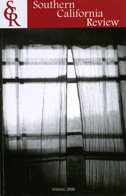
Southern California Review, formerly known as the Southern California Anthology, is the literary journal of the Master of Professional Writing program at the University of Southern California. It has been publishing fiction and poetry since 1982 and now also accepts submissions of creative nonfiction, plays, and screenplays. Printed every October and April with original cover artwork, every issue contains new, emerging, and established authors.
Unsolicited manuscripts are read year-round; response time for submissions is three to six months. Sim/subs accepted. No queries required.
The inagural issue – Volume 1 Number 1, Spring 2008 – was released late April under Editor-in-Chief Annlee Ellingson, and features:
Cover art by Amber Arseneau
Fiction by Gary Fincke, Judith Freeman, and Michael Buckley
Poetry by Richard Foerster, Bonnie Louise Barrett, Susanna Rich, Jennifer Jean, Daniel Polikoff, Moira Mageson, and Paul Brancato
Nonfiction by Christopher Buckley
Stageplay by Lee Wochner
An Interview with Nathan Englander
And prize-winners in One-Act Play – Kristna Sisco Romero, and Poetry – Elisabeth Murawski, CB Follett, Leonard Kress.
SCR is also holding a fiction contest, deadline August 31, 2008, and a poetry contest, deadline December 31, 2008.
Spread the word!
Jobs :: Various
East Los Angeles College English Department seeks applicants for a tenure-track position in English.
The Richard Stockton College of New Jersey seeks applicants for a tenure-track Assistant Professor in Literature for their Literature Program to start September 2008. Dr. Robert Gregg, Dean of Arts & Humanities.
American University Department of Literature in the College of Arts & Sciences
invites applications for a one-year, full-time temporary assistant professor in Creative Writing/Fiction for the 2008-09 academic year to teach upper-level & graduate courses in fiction writing as well as in General Education courses. Jonathan Loesberg, Chair, Department of Literature. May 15.
Saint Louis University, a Jesuit Catholic institution dedicated to student learning, research, healthcare, and service, seeks applications for a Assistant Professor of English specializing in Creative Writing. Professor Sara van den Berg.
Spread the word!
Books :: Victorian Women’s Relationships
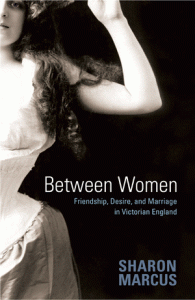 Between Women
Between Women
Friendship, Desire, and Marriage in Victorian England
by Sharon Marcus
Women in Victorian England wore jewelry made from each other’s hair and wrote poems celebrating decades of friendship. They pored over magazines that described the dangerous pleasures of corporal punishment. A few had sexual relationships with each other, exchanged rings and vows, willed each other property, and lived together in long-term partnerships described as marriages. But, as Sharon Marcus shows, these women were not seen as gender outlaws. Their desires were fanned by consumer culture, and their friendships and unions were accepted and even encouraged by family, society, and church. Far from being sexless angels defined only by male desires, Victorian women openly enjoyed looking at and even dominating other women. Their friendships helped realize the ideal of companionate love between men and women celebrated by novels, and their unions influenced politicians and social thinkers to reform marriage law.
Through a close examination of literature, memoirs, letters, domestic magazines, and political debates, Marcus reveals how relationships between women were a crucial component of femininity. Deeply researched, powerfully argued, and filled with original readings of familiar and surprising sources, Between Women overturns everything we thought we knew about Victorian women and the history of marriage and family life. It offers a new paradigm for theorizing gender and sexuality–not just in the Victorian period, but in our own.
Sharon Marcus is Associate Professor of English and Comparative Literature at Columbia University.
*Thanks to Bronte Blog for noting this book.
Spread the word!
Workshop :: Antioch 7.12
 Antioch Writer’s Workshop
Antioch Writer’s Workshop
July 12 – 18, 2008
Yellow Springs, OH
Fiction, Narrative Nonfiction, Poetry, Memoir, Mystery
Keynote: Myla Goldberg, Author of Bee Season and Wickett’s Remedy
Spread the word!
Online Lit Mags :: Hello?!
Sponsored or not, I would appreciate knowing when you post new issues online. NewPages has a Magazine Stand on which we update our readers about new publications received, including Online Literary Mags. Since we can’t really “receive” new online mags through traditional mail, all you have to do is drop me a note when you post new issues: [email protected]. Of course, sponsor mags get 50 or so words to describe their publication (sponsors please send me this!), but all others get at least a link. C’mon – don’t be shy! Let our readers know you want to be read!
Spread the word!
Finalists Announced :: Tupelo Press
Best of luck to finalists and semifinalists of the Tupelo Press 2008 Snowbound Chapbook Award. They anticipate announcing the winner this May.
Finalists:
Lisa Beskin – Belchertown, MA, Shadow Globe
Remica Bingham – Norfolk, VA, The Body Speaks
Deb Casey – Eugene, OR, Spit & Purr, What Shines: A Several Sisters Chapbook
John de Stefano – New York, NY, From: Critical Opalescence and the Blueness of Sky
Mary Molinary – Memphis, TN, The Book of 8:38
Jamie O’Halloran – Los Angeles, CA, The Visible Woman
Howard Robertson – Eugene, OR, Three Odes to Gaia
Robin Beth Schaer – New York, NY, Almost Tiger
Suzume Shi – New London, CT, Ao
Jacob Shores-Arguello – Fayetteville, AR, John Barleycorn Must Die
John Surowiecki – Amston, CT, Mr. Niedzwiedzki’s Pink House
Janet Sylvester – Kittery, ME, The Unbinding
Stacey Waite – Pittsburgh, PA, the lake has no saint
Semifinalists:
Hadara Bar-Nadav – Kansas City, MO, Fable of Flesh
Colin Cheney – Brooklyn, NY, Here There Be Monsters
Mark Conway – Avon, MN, Dreaming Man, Face Down
John de Stefano – New York, NY, From: Three-Body Problems
Joanne Diaz – Chicago, IL, Violin
Jennifer Kwon Dobbs – Astoria, NY, Mongrel Angels
Matthew Hittinger – Astoria, NY, Spectacular Reflection
Christina Hutchins – Albany, CA, Dark Creek
M. Smith Janson – Florence, MA, Letter Written in this Life, Mailed from the Next
Jesse Lee Kercheval – Madison, WI, My Life as a Silent Movie
Sandra Kohler – Dorchester, MA, Final Summer
Gary Copeland Lilley – Swannanoa, NC, Wade In Da Wahtuh
Matthew Lippman – Claverack, NY, Moses
Mike Maniquiz – Clovis, CA, Cooking Frutti Di Mare on This Early Evening Before the Night Falls on Kentucky Hillsides
Mary Helen Molinary – Memphis, TN, This Book of Sun
Rusty Morrison – Richmond, CA, Insolence
Teresa Pfeifer – Chicopee, MA, Little Matryoshka
Joseph Radke – Milwaukee, WI, A Source of Reasons
Boyer Rickel – Tucson, AZ, reliquary
Reginald Shepherd – Pensacola, FL, Photos of the Fallen World: Poems
Page Hill Starzinger – New York, NY, Black Tongue
Barry Sternleib – Richmond, MA, Winter Crows
Jonathan Weinert – Concord, MA, Charged Particles
Spread the word!
A First! :: First Book on eBay
 From Kyle Zimmer, President, First Book:
From Kyle Zimmer, President, First Book:
First Book is joining forces with eBay Foundation, the charitable arm of eBay Inc., for Community Gives – an online fundraising campaign designed to engage the eBay Community in supporting First Book’s mission to provide new books to the children who need them most.
First Book is one of only three organizations eBay Foundation has chosen to support, based on input from the eBay Community. The campaign kicked off on Monday with a $1 million grant split evenly among First Book, Best Friends Animal Society and Oxfam. In addition, to encourage participation eBay Foundation will give an extra dollar to First Book for every person who donates.
Funds generated will support First Book’s to reach and provide brand new books and educational resources to tens of thousands more Recipient Groups nationwide.
